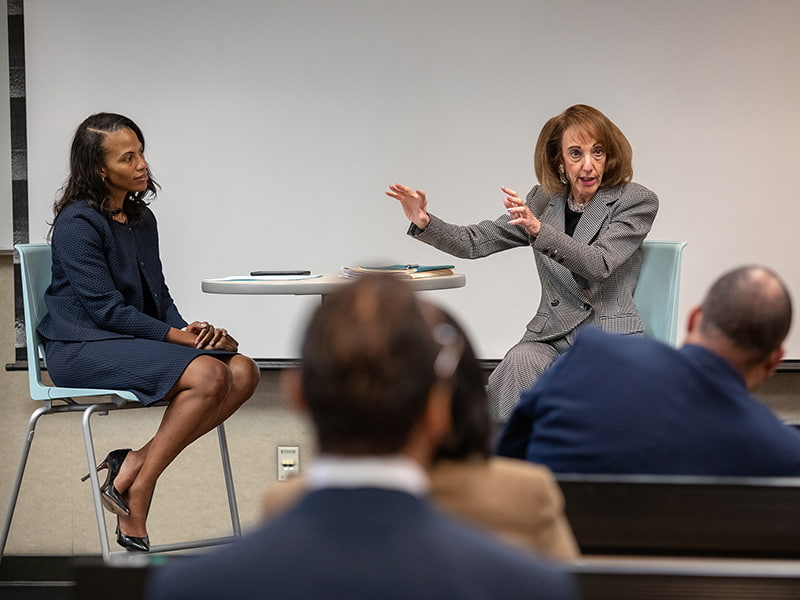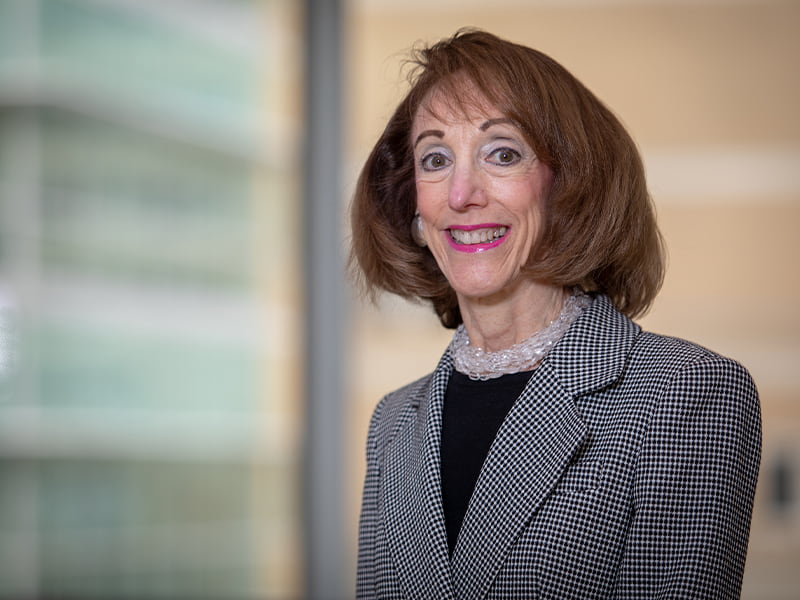SOPH executive in residence shares population health expertise

In 2012, 36 Mississippi counties were faced with having no coverage options of the health insurance marketplace. Heidi Margulis and her team at Humana saw an opportunity to “Do well by doing good” by serving the population and learning new ways to deliver care.
Margulis came back to the state last week, visiting the University of Mississippi Medical Center as the inaugural Executive in Residence for the John D. Bower School of Population Health.
Executive in Residence programs are common at business schools, said Dr. Bettina Beech, dean of the School of Population Health, but they also bring great value to other schools.

“These programs allow academic institutions to develop meaningful engagement with retired or semi-retired senior leaders from a range of industries to lecture, coach, and mentor students, and to link schools to industry,” Beech said. “They bring energy and perspective to campuses that augment classes and research projects and can launch long-term relationships between executives and the school, and these connections can translate into professional opportunities and summer internships for students.”
Margulis, chief corporate affairs officer at Humana until 2019 and now a senior advisor for the company and its Foundation, spent the week meeting with faculty and students talking about her experiences in the business and the real-world applications of population health.
“I was really impressed with the caliber of commitment, compassion and clinical expertise,” Margulis said. “If you have a true commitment to better health, you can’t make that kind of change in a region that ranks at the top of the most-healthy lists.”
A native of Louisville, Kentucky, Margulis says her state and Mississippi face some of the same health challenges. To bring coverage to Mississippi, the company pitched their health insurance plans as a research and development project, learning how to provide the best coverage possible.
One lesson Margulis and her team learned was what does and doesn’t work in encourage preventive care. The company’s insurance plan offered enrollees assistance in finding a primary care physician and a free wellness visit.
“There was about zero uptake,” Margulis said. “What we learned is that it is important to find influencer in the community that others can trust.”
Faith-based institutions and leaders were able to help bridge the gap and help parishioners make healthy choice in their everyday lives.
“There was a pastor in DeSoto County who substituted out the congregation’s fried chicken luncheon with a healthier baked option,” Margulis said.

Prior to 2012, the company’s involvement in Mississippi’s health insurance landscape was primarily through contracts with Department of Defense and Medicare. Insuring civilians and those under 65 wasn’t part of their portfolio. They offered insurance on the exchange for two years, which incentivized other companies to come in and offer insurance.
At the national level, Margulis is also one of the architects of Humana’s population health program the “Bold Goal,” which aims to improve the health of communities they serve by 20 percent – measured by healthy days – by 2020 and beyond. Humana and its non-for-profit arm decided to focus on to social determinants of health: food security and social isolation.
For instance, Margulis said, “the Foundation funds projects that test different solutions to food security or food-banking models, whether that be mobile apps that help people locate food or gardening classes.”
One program that worked well for decreasing social isolation was OATS, or Older Adults Technology Services. These classes teach seniors citizens not just how to use email and social media, but also how manage their finances and health information online.
Through her career, Margulis learned that “health care is one size fits none. You have to tailor the coverage to the people and communities you serve.”
The same goes for the company’s approach to their Bold Goal communities. Starting with clinical town halls, they transition into health advisory boards co-led by a community member and a company representative. Each city or county board identifies its own focus. In Louisville, they focus on asthma. In Baton Rouge, its obesity. In Tampa Bay, its substance use disorders.
During her time at UMMC, Margulis asked each faculty member she met with how they saw her residence fitting in with their lesson plans. Dr. Charles Chima, assistant professor of population health science, put it best, she said.
“He told me that it’s the faculty’s job to teach the principals of population health to students, while my role was to teach the applications of these principals in the marketplace.”
“In the 34 years she spent at Humana, she was integral in building their population health portfolio, including the Bold Goal initiative led by the Humana Foundation,” Beech said. “Her wealth of knowledge and experience has been an invaluable contribution to the education of the students and faculty in the School of Population Health.”
Dr. Roy Beveridge, former chief medical officer for Humana, will be the SOPH’s next Executive in Residence later this spring.


